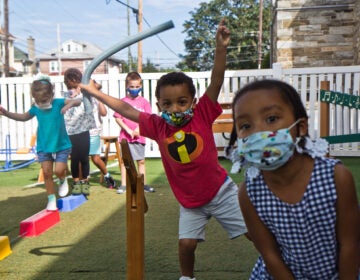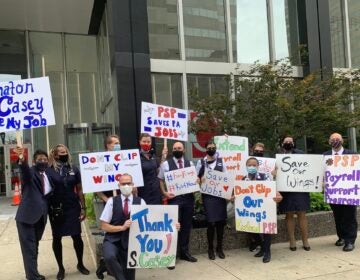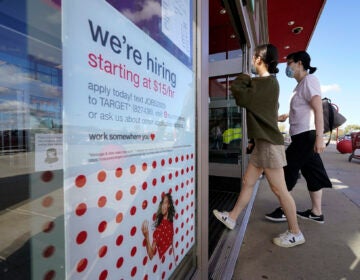‘Staggering’ need: Coronavirus shutdown squeezing Pa.’s most vulnerable residents
As Pennsylvania’s school shut down stretches into its third week, many families are feeling the strain.
Listen 5:06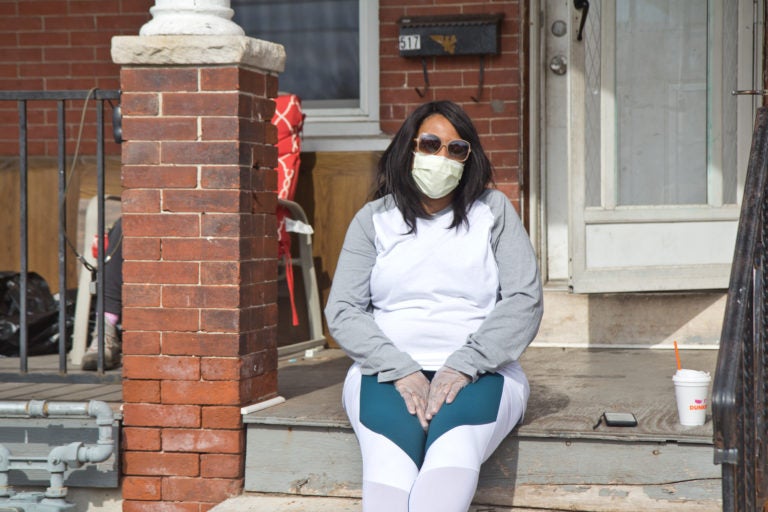
Like many families in Pennsylvania, Lakeyia Johnson's, of Norristown, is feeling the strain of the coronavirus shutdown. (Kimberly Paynter/WHYY)
Lakeyia Johnson’s look has changed a lot over the last few weeks.
On the rare occasion she leaves her home in Norristown, Johnson’s outfits are now coordinated around latex gloves and a facemask — defenses against the coronavirus pandemic. She likes to wear a hooded sweatshirt too, the hood pulled tight.
Johnson’s demeanor has changed as well. When Keystone Crossroads first visited the single mother of three school-age children on March 13, the first day of Montgomery County’s school closures, she was upbeat and cheerful. But, two weeks later, that cheeriness had mostly faded. Johnson seemed subdued, shoulders hunched and eyes ringed by dark circles.
“I’m tired. I haven’t been sleeping well,” she said, sipping a large Dunkin Donuts coffee on her porch. “I’m not good with being in the house all day. It’s really bothering me.”
As Pennsylvania’s school shut down stretches into its third week, many families are finding it increasingly difficult to balance restless kids with work obligations, and there is little relief in sight.
For Johnson, one of the biggest challenges has been finding ways to keep her children both sane and safe. The novelty of playing videogames all day has worn off for her ten year-old son Josh, so she’s been letting him ride his bicycle around the neighborhood in the mornings.
“But he’s not allowed to go in stores. He’s not allowed to be close to people. He’s not allowed to touch people or anything. And, when he comes in, I make him shower, and wash his hands, and wash his clothes,” Johnson said.
Johnson’s also worried about money. Last month — what now seems an eternity ago — she was hired by a nearby call center. It was her first job after years of being sidelined by medical issues. Initially, she hoped to organize a childcare collective so she could go into work a few days a week, but that fell through when most parents were reluctant to have other kids in their house.
The call center did offer to let her work from home, Johnson said. “But [they] said I had to do it in a quiet place. Which is kind of impossible.”
She hasn’t worked a shift since the shutdown, and paying bills has been tough.
Money is tight for Maricela Guzman too.
When the shutdown began, the Pottstown mom considered herself one of the lucky ones: ACLAMO Family Center, the Latinx non-profit she works for, was letting her work from home.
But the non-profit does a lot of work with kids in after-school programs, so when Pennsylvania Governor Tom Wolf announced last week that school closures would be extended, the center faced tough decisions: Guzman’s salary was cut by twenty percent.
“I’m not complaining,” Guzman said. “But it is kind of tough.”
Guzman said the reduction has forced her to make some stressful financial decisions.
The 32 year-old has status in the country through DACA — Deferred Action for Childhood Arrivals — and she had been planning to put a portion of her tax refund into a savings account to pay her biannual work permit fee. Now that refund will likely go to bills.
And she’s deferring a planned trip to Walt Disney World with her ten year-old son this summer.
“I had been putting this off for about two years now and I was like, ‘This is the year,’” she said. “And now it’s not going to happen.”
‘In a drought’
Guzman and Lakeyia Johnson both say they are relying more and more on the free meals distributed by the school districts in their cities to keep their kids fed.
That’s true for families across the state. In Philadelphia, the need for free meals has skyrocketed as the end of the month draws to a close. The School District of Philadelphia and other nonprofit organizations distributed 220,000 meals last week — a nearly five-fold increase from the week before.
“As we had expected, there is a growing demand for meals the longer students are out of school,” said Philadelphia Deputy Mayor Cynthia Figueroa.
Mastery Schools, the city’s largest charter-school network, saw a sudden spike in meal distribution last week.
On Monday, the network logged about 16,000 meals. By Thursday, the number had grown to nearly 30,000.
“We can see from the rapid rise in demand for meals that the economic implications of the COVID-19 crisis are staggering — there is a growing need to support our most vulnerable students and families at this critical time,” said Mastery Schools CEO Scott Gordon in a statement.
The chart below shows how quickly demand grew at Mastery sites across the city last week.
The need at New Kingdom Baptist Church in Kensington has mirrored that trend.
On Monday, March 16th, the church was flyering the neighborhood to spread the word about its twice-daily emergency-meal program.
That day, about a dozen folks showed up for a hot lunch of chicken patties and french fries in the church basement.
By Friday, March 27th, the church was doling out about 100 breakfasts and 100 lunches each day, according to Pastor Daniel Jackson.
“I can only see it growing as time moves on because money’s getting short,” said Jackson. “But we’ll be here. We’ll serve.”
The lunch crowd tends to come in two waves. The first are mostly people experiencing homelessness. Some, Jackson said, used to rely on local soup kitchens that are temporarily shuttered.
Then the families pull up — usually in cars. They send a child inside to grab a few to-go containers and then drive away.
The church volunteers now have a well-rehearsed system for greeting people and distributing the meals. They know the regulars and their orders. Two meals for one man who lives on the street with his wife. Six meals for a large family that shows up every day.
Jesse Klose, 48, says he’s a recovering heroin addict who is on the street right now. He used to pick up regular construction jobs, but it’s been about a week since he’s gotten any work.
“I’m in a drought right now because of this situation,” Klose said.
Pastor Jackson said the church spends about $400 a day on meals and will keep the operation running as long as schools are closed. But the pastor admits, his own coffers are getting low.
About a dozen parishioners volunteer every day to cook and distribute the meals. It’s front-line work in a nervous time, but they say this is what they’re called to do.
“We trust and believe God,” Jackson said, “that if we take care of his people, he’ll take care of us.”
WHYY is your source for fact-based, in-depth journalism and information. As a nonprofit organization, we rely on financial support from readers like you. Please give today.



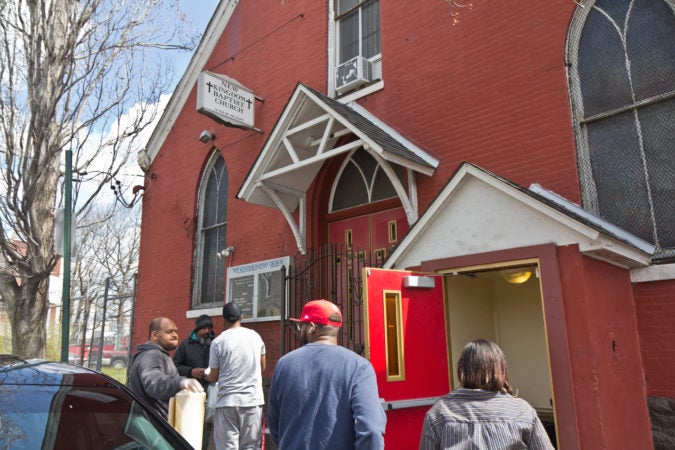
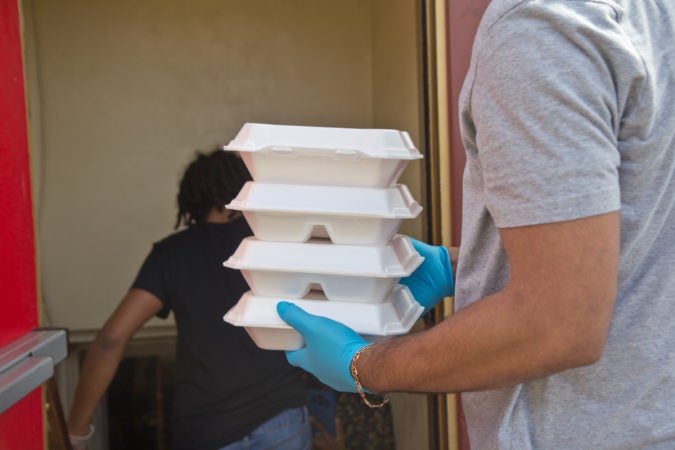
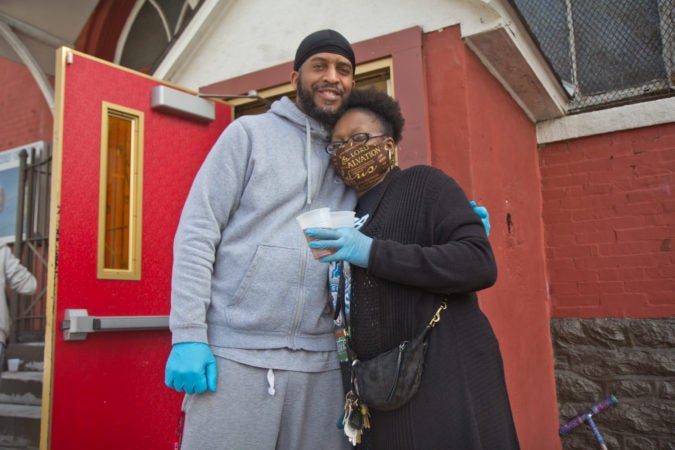
![CoronavirusPandemic_1024x512[1]](https://whyy.org/wp-content/uploads/2020/03/CoronavirusPandemic_1024x5121-300x150.jpg)
